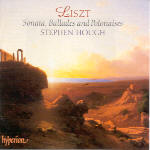Stephen Hough couples Liszt’s oft-recorded Second Polonaise and Second Ballade with the composer’s neglected first essays in these respective genres. The dark, introspective C minor Polonaise particularly deserves attention for its striking drama and harmonic daring, yet Hough’s clipped phrasing and dynamic inhibition fall short of selling this discursive work. Similarly, we miss the E major Polonaise’s requisite pomp and swagger, and Hough’s hard-nosed dispatch of the transitional cadenza robs the music of its mystery. He also seems impatient at the D-flat Ballade’s start, in contrast to Leslie Howard’s tender, spacious reading (also on Hyperion), and the central march rhythms are tightly wound rather than full of body.
Nor does this proficient pianist shed inhibitions in the B minor Ballade. He pulls back at climactic moments and evokes nothing of the terror and rhetorical abandon you get from the Arrau and Horowitz recordings. While Hough gives himself over to the Sonata’s broadly grandiose moments, he plays safe with the polyphonic interweaving in the exposition and the fugue, and never quite allows Liszt’s rolling paragraphs to reach their boiling thresholds. Still, there are affecting passages only a great pianist can bring off: the hushed simplicity of the Quasi Adagio leading into the fugue; the sustained calm of the final pages; and Hough’s marvelously assured octave playing throughout. Nevertheless, in their divergent ways, Arrau, Richter, Argerich, Levy, Cortot, and Horowitz best reveal the full scope of the Sonata’s epic, large-scale vision.
































